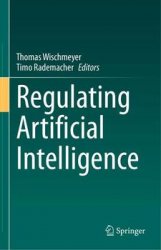|
 Название: Regulating Artificial Intelligence Название: Regulating Artificial Intelligence
Автор: Thomas Wischmeyer, Timo Rademacher
Издательство: Springer
Год: 2020
Страниц: 391
Язык: английский
Формат: pdf (true), djvu
Размер: 10.1 MB
The ongoing process of digital transformation is being accomplished in part with the use of Artificial Intelligence (AI), an interdisciplinary technology that aims to use large data sets (Big Data), suitable computing power, and specific analytical and decision-making procedures in order to enable computers to accomplish tasks that approximate human abilities and even exceed them in certain respects. AI is used, for example, in search engines, in communication platforms and robots, in intelligent traffic-control systems, for automated administrative or judicial decision-making, in automated vehicle-assistance systems, in medical diagnostics and therapy, in smart homes, and in cyberphysical production systems (Industry 4.0), as well as in the military field. The expansion of algorithm-based analytical and decision-making systems that work with AI also facilitates new forms of surveillance and for controlling behaviour, but also new kinds of criminal activity.
AI is - currently - dominated by techniques of Machine Learning (ML). The term refers to computer programs that are able to learn from records of past conduct. Machine Learning is used for such purposes as identifying patterns, evaluating and classifying images, translating language in texts, and automatically generating rough audio and video cuts (e.g. ‘robot journalism’). Also possible are even more advanced applications of AI, sometimes referred to as ‘Deep Learning’. This has to do with IT systems that, by using neural networks, are capable of learning on their own how to enhance digital programs created by humans and thus of evolving independently of human programming. The expansion of AI’s capabilities and the tasks for which it can be used is associated with both risks and opportunities.
This book assesses the normative and practical challenges for artificial intelligence (AI) regulation, offers comprehensive information on the laws that currently shape or restrict the design or use of AI, and develops policy recommendations for those areas in which regulation is most urgently needed. By gathering contributions from scholars who are experts in their respective fields of legal research, it demonstrates that AI regulation is not a specialized sub-discipline, but affects the entire legal system and thus concerns all lawyers.
Machine learning-based technology, which lies at the heart of what is commonly referred to as AI, is increasingly being employed to make policy and business decisions with broad social impacts, and therefore runs the risk of causing wide-scale damage. At the same time, AI technology is becoming more and more complex and difficult to understand, making it harder to determine whether or not it is being used in accordance with the law. In light of this situation, even tech enthusiasts are calling for stricter regulation of AI.
The book is divided into two major parts, the first of which focuses on features common to most AI systems, and explores how they relate to the legal framework for data-driven technologies, which already exists in the form of (national and supra-national) constitutional law, EU data protection and competition law, and anti-discrimination law. In the second part, the book examines in detail a number of relevant sectors in which AI is increasingly shaping decision-making processes, ranging from the notorious social media and the legal, financial and healthcare industries, to fields like law enforcement and tax law, in which we can observe how regulation by AI is becoming a reality.
Скачать Regulating Artificial Intelligence
|
Автор: literator 30-11-2019, 03:44 | Напечатать
Уважаемый посетитель, Вы зашли на сайт как незарегистрированный пользователь.
|
|
|